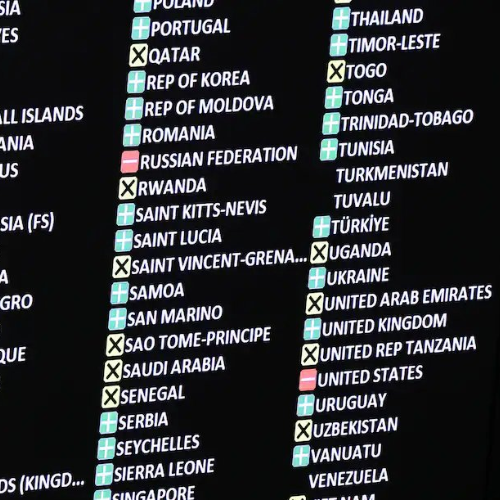The United States voted against a United Nations resolution that condemned Russia for its aggression in Ukraine. This resolution, which called for Russia to return Ukrainian territory, was supported by most countries but faced opposition from a small group, including Russia, North Korea, Iran, and several other nations friendly to Moscow.
The vote marked a major shift in U.S. policy. For the first time since the war began, Washington refused to back Ukraine in a U.N. resolution. The decision also created a sharp divide between the U.S. and its European allies, who overwhelmingly supported the resolution.
Instead of supporting Ukraine’s proposal, the U.S. presented its own version, which simply called for an end to the war without blaming Russia. However, when European countries pushed to add language holding Russia accountable, the U.S. decided to abstain rather than vote for its own resolution. Despite this, both resolutions passed.
Hungary’s Bold Resistance: Delaying EU Sanctions Amid U.S.-Russia Talks
Tensions Rise Between U.S. and Europe
The vote took place on the third anniversary of Russia’s invasion of Ukraine. While the General Assembly’s decision is not legally binding, it sends a strong message about global opinion.
The U.S. move to distance itself from Europe was evident when its ambassador defended the milder U.S. resolution, calling it “elegant in its simplicity” and claiming it focused on ending the war rather than assigning blame. However, European nations strongly disagreed. France, Britain, Denmark, and Slovenia proposed key amendments to strengthen the language against Russia. The U.S. had warned that it would veto its own proposal if those amendments were included, but Russia stepped in and vetoed them first, preventing the need for U.S. action.
As tensions escalated at the U.N., world leaders were meeting elsewhere to discuss the war. U.S. President Donald Trump hosted French President Emmanuel Macron at the White House for private talks, followed by a virtual meeting of the G-7 nations. The discussions were strained, as the U.S. opposed strong wording against Russia in a joint G-7 statement on Ukraine. Trump later posted online, mocking Canadian Prime Minister Justin Trudeau by calling him “Governor” Trudeau, referring to his controversial claim that Canada should become a U.S. state.
Ukraine Stands Firm as Pressure Mounts
Ukraine, which had been warned by the U.S. to withdraw its resolution, refused to back down. The country’s deputy foreign minister addressed the General Assembly, calling the moment a “historic test” for the world. She warned that how countries respond to Russian aggression today will shape the future of global security.
Devastating Diplomatic Betrayal: US Excludes Ukraine in $500bn Deal Talks
Despite the U.S. opposition, Ukraine’s resolution passed with overwhelming support from European and democratic nations. However, several countries, including China, Argentina, Brazil, and many African nations, abstained from the vote.
Many Ukrainian officials and soldiers were shocked by the U.S. decision. One Ukrainian army officer fighting Russian and North Korean troops expressed disbelief, saying it felt like a scene from a science fiction novel.
Following the vote, Trump suggested that the war would never have started if he had been president earlier. He also revealed plans for a controversial economic deal with Ukraine, proposing that Kyiv hand over 50% of its mineral wealth to the U.S. in exchange for continued support.
The dramatic shift in U.S. policy has left many wondering what’s next. While Ukraine remains determined to defend its land, the U.S. has signaled a different approach—one that prioritizes diplomacy with Russia over supporting its European allies.


